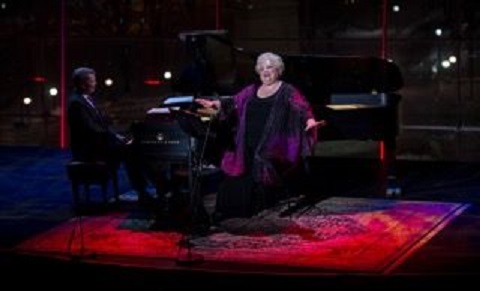 United StatesWe’ll Meet Again: The Songs of Kate Smith: Stephanie Blythe (mezzo soprano), Craig Terry (piano), Walter S. Gubelmann Auditorium, The Society of the Four Arts, Palm Beach, FL, 13.1.2016. (RP)
United StatesWe’ll Meet Again: The Songs of Kate Smith: Stephanie Blythe (mezzo soprano), Craig Terry (piano), Walter S. Gubelmann Auditorium, The Society of the Four Arts, Palm Beach, FL, 13.1.2016. (RP)

Kate Smith, the self-styled “Songbird of the South,” was the embodiment of can-do optimism and patriotism for many in mid-20th-century America. In 1939, introducing her to King George VI, President Franklin D. Roosevelt declared, “This is Kate Smith. Miss Smith is America.’’ In a career that spanned 50 years, Smith was a star of stage, radio and television and also appeared in films. Her totals are astounding: more than 6,000 radio shows and just under 3,000 songs recorded, with 600 or so of the 1,000+ new songs she introduced making the Hit Parade, and a record-breaking run at New York’s Palace Theater. Kate Smith’s endorsement meant huge sales, whether it be home freezers or US war bonds. She is credited with selling $600 million of bonds in a series of marathon radio broadcasts during World War II. Jack Paar, the television comedian and talk-show host, perhaps best summed up her appeal: “If a rainbow could sing, it would sound like you.”
Stephanie Blythe brought her tribute to the great singer, We’ll Meet Again: The Songs of Kate Smith, to Florida in an evening jointly sponsored by the Palm Beach Opera and The Society of the Four Arts. The show was conceived five years ago, and Blythe has toured the country with it; it has also been televised on PBS’s Live From Lincoln Center. This was, and clearly is, a labor of love for her, with considerable time spent researching Smith and refining the program. None of this would mean a thing if Blythe didn’t have the voice to deliver the songs, and she does. Singing without amplification, her voice was radiant, filling the hall with joy ̶ and boy, can she belt. Personally, I could do with less patter (or at least more focus) and more singing, but that is a minor quibble.
And then there were the songs, which swept over many in the audience as a welcome wave of nostalgia. Blythe open with ”When the Moon Comes Over the Mountain,’’ which Smith sang on her first radio show in 1931 (she also wrote some of the lyrics) and kept as her theme song throughout her career. In “There’ll Be Bluebirds over the White Cliffs of Dover,” which Smith introduced to American audiences in October 1941, shortly before the USA entered the war, Blythe sang one of the choruses sotto voce, with just the thinnest, shimmering thread of tone. It was at once fresh, breathtaking and beautiful. Pianist Craig Terry, who clearly put his all into this program, had a similar moment in “When You Wish Upon a Star,” when he had a solo turn in that well-known song from the Disney film Pinocchio. There were other wonderful songs, ranging from the upbeat “Dream Your Troubles Away” and “Look for the Silver Lining” to the wistful “Memories of You.” Blythe ended with “We’ll Meet Again,” in which she invited the audience to sing along on the final chorus. For an encore, she turned to “This Is All I Ask,” a song that Smith sang at her 1963 Carnegie Hall concert.
With the audience on its feet, Blythe told them to stay put, quipping, “You don’t think that you would leave without me singing it, do you?” And so she broke into “God Bless America” with the audience singing along. It was a smart move: none of the inevitable comparisons between Smith and her on that song were possible. Smith once remarked to Irving Berlin, who composed the song specifically for her, that it would be remembered long after they were gone and forgotten. She was wrong, as her voice is still heard singing “God Bless America” in sports venues in the USA as no one else ever has or will. Thanks to Stephanie Blythe, today’s audiences can enjoy a bit of the phenomenon that was Kate Smith.
Rick Perdian